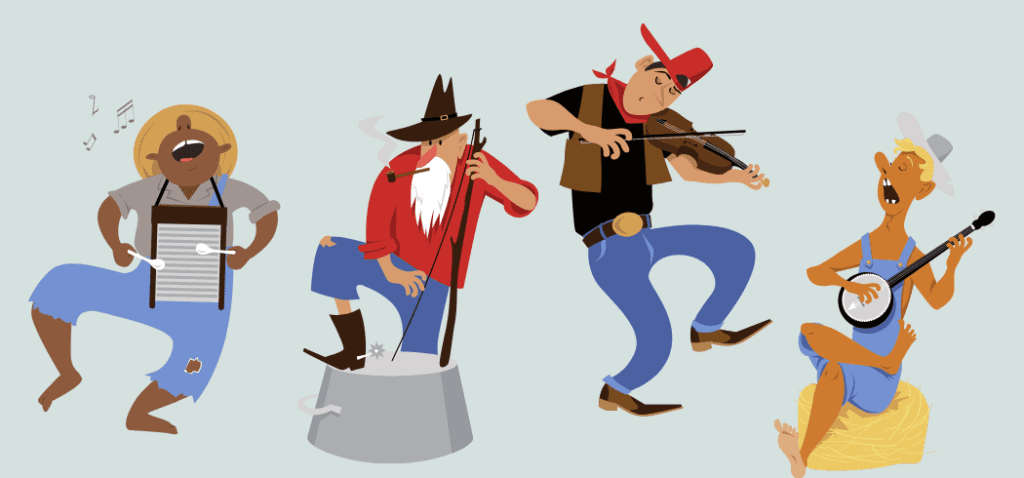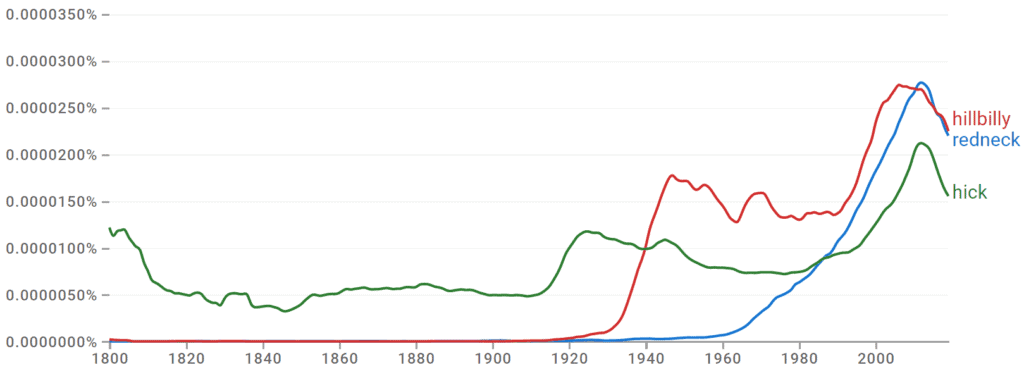With colloquial terms for rural folks, the words “redneck,” “hillbilly,” and “hick” are usually the terms we see get thrown around. But did you know that each of these delicate terms has its own distinct connotations and origins? I’ll dive into the differences between these words and explore their history, so you know how to use them respectfully.
Redneck vs. Hillbilly vs. Hick
Before I delve deep into the differences between these three common words, let’s define what each of them generally means.
A “redneck” is mostly associated with working-class, southern, and rural white Americans who have a strong sense of pride in their heritage and often display it through their attire, attitudes, and language.
I always think of the Blue-Collar Comedy Tour crew and how they always made redneck jokes about all the qualities that make up a redneck. But the term actually has some more meaningful roots, which I’ll explain in a moment.
“Hillbilly” is the word meant to describe people living in remote, mountainous regions who might even have a distinct cultural identity and are often seen as unsophisticated by outsiders. Just think of the T.V. show Outsiders with Joe Anderson. Those are what hillbillies technically would be.
Most people would actually consider the word “hick” as a slur or insult. It’s a more general term used to describe anyone perceived as rural, uneducated, and unsophisticated. I’ve never seen it used in a positive way, so keep that in mind.
Difference Between Hillbilly and Redneck
While “redneck” and “hillbilly” can both mean rural, southern Americans, there are some subtle differences between the two terms that you should know.
A “redneck” would be someone who might have a blue-collar job, like farming or construction, and is sometimes associated with a more politically conservative ideology.
In contrast, a “hillbilly” leans more toward roles like ones in the mining or logging industry and can be associated with a more rugged, self-reliant way of life.
Hick vs. Redneck
A “hick” is considered by most to be more unsophisticated and backward, whereas a “redneck” is often viewed as more rugged and hard-working.
Plus, “redneck” can even imply a sense of pride in one’s southern heritage, but “hick” is simply a derogatory term and should be avoided if you can.
Hick vs. Hillbilly
You can use both “hick” and “hillbilly” to connote a rural, unsophisticated way of life, but try to use “hillbilly” in this context because it tends to be associated with a more specific geographic region – like mountains – while “hick” is just, well, mean.
Origins of the Words Redneck, Hillbilly, and Hick
The origins all have roots in rural, southern culture. “Redneck” is thought to have originated in the late 1800s as a way to describe farmers who worked in the sun all day and ended up with sunburned necks. There are also traces back to the 1830s when it was a term used to describe an uncouth countryman.
However, when looking back at The Battle of Blair Mountain, which was one of the largest (labor) uprisings in America since the Civil War, we see the term redneck used to describe the coal minors and how they wore red kerchiefs around their heads and necks.
“Hillbilly” likely comes from the Scottish word “billie,” which means fellow or comrade, and refers to the Scots-Irish immigrants who settled in the Appalachian Mountains.
One of the oldest published forms was in 1892 in The Railroad Trainmen’s Journal where an excerpt says, “I would hate to see some old railroad man come here and take my job, and then, I don’t think it is right to hire some Hill Billy and give him the same right as I just because he was hired the same time I was.“
“Hick” has more uncertain origins, but it likely comes from the word “hickory,” which was used as an offensive slang term for uneducated people who lived in the woods.
Sentences Using the Word Redneck
- He’s such a proud redneck; he’s got a Confederate flag flying on his truck.
- The group of rednecks was sitting on the porch, drinking beer and listening to country music.
- I always considered rednecks to be working-class white people.
- My cousin is a redneck through and through; he loves hunting, fishing, and all things outdoorsy.
- The redneck stereotype often includes chewing tobacco and wearing camo.
- She may be a city girl, but she’s got a bit of a redneck streak in her; she loves going to rodeos and eating BBQ.
Sentences Using the Word Hillbilly
- I’m not going there; that town is full of hillbillies.
- He’s not just any old country boy; he’s a true-blue hillbilly, born and bred in the Appalachians.
- That movie depicted hillbillies as uneducated and backward, which angered everyone who was watching it.
- She was surprised when her new roommate turned out to be a hillbilly, but they ended up bonding over their shared love of bluegrass music.
- The group of hillbillies played their banjos and sang songs around the campfire and even invited us to join in. It was a great time!
Sentences Using the Word Hick
- He was wrongfully dismissed as a hick from the countryside when he arrived in the big city.
- The snobby city folk looked down on him for his hick accent and rural upbringing, but he showed them they were wrong.
- I felt a little like a hick when I went to the fancy gala in my cowboy boots.
- The comedians made fun of hicks in their stand-up routine, but it seemed a lot of people found it offensive.
- The hick stereotype often includes wearing overalls and chewing on a piece of straw.
Be Careful How You Use These Terms
Whether these terms are used affectionately or derogatorily depends on the context and the relationship between you and the person/people on the receiving end. As a good rule, just avoid using the term “hick” if you can because there’s a good chance it will just come across as offensive.


